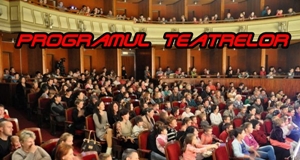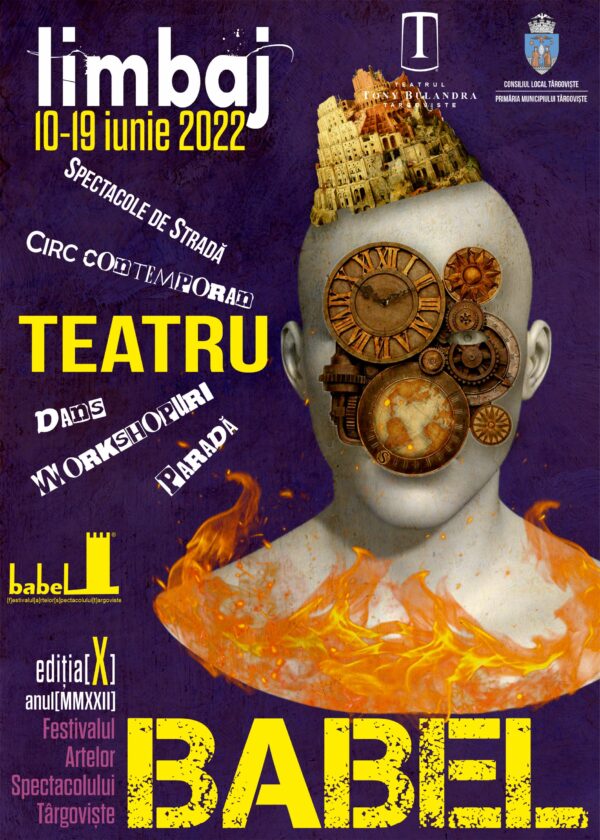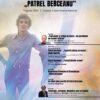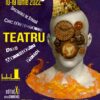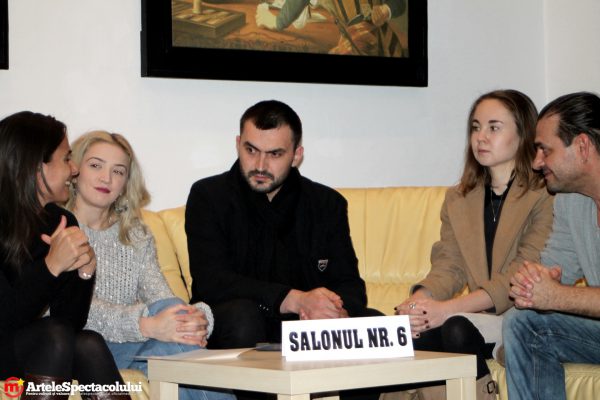
Dumitru Acris, Romanian director and actor, who lives and works both in Romania and Russia, it is one of the most appreciated theatre people on a national and international level. Dumitru Acris doesn’t seize to amaze us with each new project.
He offers innovative visions and after giving him endless applause, we become better, kinder, more understanding. The young director is in a continuous evolution and he makes us return to ourselves, like in a sweet and long waiting return at Home. We went on the sofa of the Ward No. 6, trying to arrive with Lavinia Pele, Lili Khismatullina and Oana Maria Grigoreto the most simple existential formula human-actor-play, to the essence of the biggest emotion: Love. In 17th and 18th November, Dima, as his closest friends call him, will offer to the public the play Ward No. 6, by Cehov.
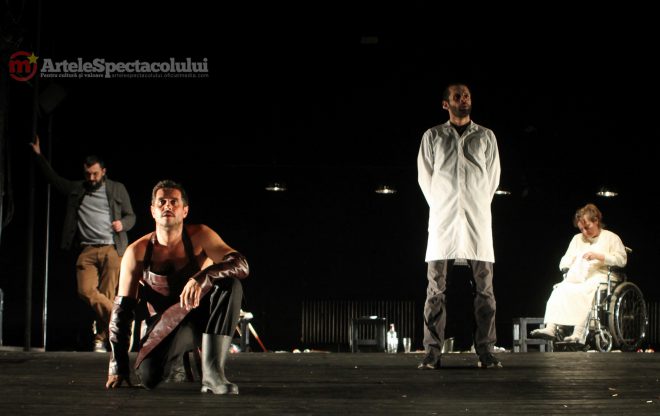
Cristi Iordache: The beautiful madman. Because that is how you are considered amongt us, the theatre lovers, maybe even amongst your colleagues. What did this nickname bring you?
Dumitru Acriș: I didn’t get it myself.
C..I.: But what do you think it brought out on the table: in your way of creating a play or in your communication with actors?
D.A.: Courage, confidence, fearlessness I think. But this comes from the desire to try, to do things that you never got the chance to do.
C.I.: To cross traditions and society’s boundaries.
D.A.: Personal boundaries. Along the 33 years old I collected a lot.
C.I.: Speaking about your debut and especially about your debut at the theatre from Targoviste. When did that happen?
D.A.: That was happening in 2008 when I came for the first time at Babel Fest. Then it took place the edition of a fest organized with zero budget. The idea of a show appeared here, in Targoviste. Here we also met with the director Suren Shahverdyan and then the show was created. So we met in June, at Babel Fest and the premiere took place in 16th November 2008. Eight years ago.
C.I.: And the show was called?
D.A.: ”Hitler in love”.
C.I.: And starting with that time and until now, “Hitler in love” was played on stages from..
D.A.:…16 countries of the world. But it changed. After the performance we had in Moscow, the show changed completely not only the text, but also the conception, the director and the way of playing. We played in Russian, 700 meters away from Kremlin and I understood that after 8 years the show has to be played differently.
C.I.: What is the resemblance between the Russian culture and the Romanian one? Because you have worked in both cultures, both languages. Here is the video
D.A.: We are dealing with this aspect now, in translation, when we create the dramatizing for Ward No. 6, so it is not simple at all. It is difficult to discuss about Romanian culture, about the culture of the Romanian and Russian theatre. There are traditions in both places, it is a thing related to the theatre school, but I believe a bit in other things. I believe that it is about the individual work with the artist, with the director and, in this matter, an important part plays the school. But it also exist the courage and the boldness that Romanian artist have, they are really good artists. Romanians have a very good distribution in Ward No.6 and in Storm and I’m speaking about the team who is behind the curtains-and then I mention the beautiful collaboration with Mr. Ranin-an eight years collaboration- I am speaking about things that have their places in my soul, I am speaking about the city’s atmosphere which is calling me every time and I am speaking about the board down on the stage…it really matters to be at the right time, to work with the right people, to have the right material, there are many, many aspects.
C.I.: Could you work in a theatre who doesn’t give you enough freedom? I mean, to have the possibility of making a whole in the floor wherever you want to, to be able to pyrograph the walls, to move things that otherwise aren’t done in a theatre. Would you be able to adapt in a theatre who doesn’t offer enough space for movement and have a few instruments to deal with?
D.A.: That is what we do on a daily basis and every normal person asks himself the same questions: “Would I succeed or not, am I capable or not?”And it matters less where you are, being Russia or Europe or Romania. It matters how much you want to do what you do and it matters how many questions you ask yourself. I was telling the artists that when you arrive home, in the evening, after repetitions, at 2, 3 ,4 o’clock in the morning to reflect on the day that passed and then it remains these questions: if you succeeded or not, what will you do tomorrow, how am I moving. I am always nervous when I start a new day of repetitions, because I don’t know what direction to follow, I never know. I am working with living persons and this is why I am always nervous. Here is the video interview.
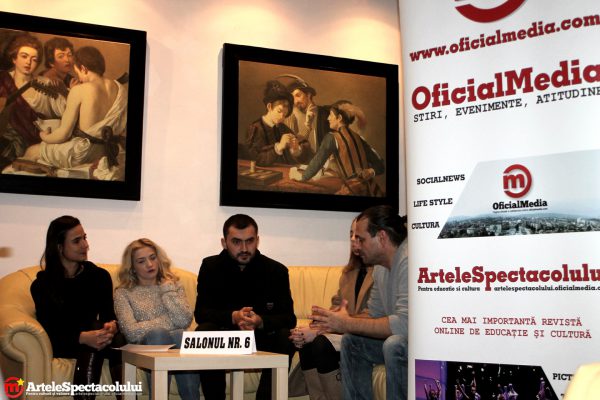
Oana Maria Grigore: I would like to ask you- I have read in an interview that you were taught in Moscow to set the things that hurt- what are the things that hurt you in this moment, regarding the society, because I suppose this is what you referred to in the interview.
D.A.: I deeply wish that in what concerns Ward No. 6, the public comes to the play to see it. Less to see it, but more to feel it. And then, it exist the director’s pain, the pain of each artist. Believe me, that in this distribution, but also in the audience, people who come to the play and the artists are very sensitive and it is very simple to make them feel painful things. What is my pain? There are many. Related to the place where I’m coming from, related to my parents. In what concerns the society, I don’t want to talk, because there is a whole spectrum of issues and pains, in each artist and human I think it exist a protest and a pain. And then the artists just have the privilege to talk about this. I think it is the most beautiful profession in the world.
C.I.: So you believe that this is your manifest and freedom.
D.A.: Yes, every time, after the setting you feel empty in the premiere show, because the next question is: how am I going to live after that, what are my pains, what material to choose, with whom am I going to work, where will I work. There are a lot of problems, a lot of questions you ask yourself and it is normal.
C.I.: But the questions you ask yourself, the questions your plays ask the public; they exist also in the public’s mind, isn’t the audience starting to ask itself “what if”?
D.A.: It would be ideal if after the play, the person will take the phone and call his parents, if he lives 1, 2, 3 days with an image from the play. If wonders are happening, then we did our job honestly.
C.I.: This is extraordinary.
O.M.G.: How did you communicated with the actors, with the technical team for this show-and now we refer at the project you are working, Ward No.6? Here is the video interview.
D.A.: We had a chemistry, a beautiful relation. I have worked as an actor at the theatre for 12 years. The director with the artists must have beautiful relations with the artists, human relations in the first place. Both, them and us, are working with human soul and then you don’t receive openness only if you start pulling some strings which are very hurtful, maybe, for artists, it is a psychological thing, a soul thing. I have a beautiful relation with the artists, let’s hope it will stay behind the curtain as an overload. For us it is important the show. The public doesn’t come to see the kitchen, he comes to see our product. And there we must talk. Love must exist in every show and in every human relation: this is the overload.
C.I.: Someone said that, when you are looking a man in the eyes, you no longer see his face. And if you don’t see his face, you don’t love him. Look entirely at the person, love his face without searching the light in his eyes and if you look only at the face, it means you love him. Do you agree with this quote?
D.A.: I had a casting in the theatre and there were a lot of questions..
C.I.: So you have to look them in the eyes?
D.A.: I don’t see a relation in our daily life and in working with actors that is not based on honesty, openness, I just don’t believe in another relation. When the actors have trust in the director, and when you trust the actors, the most important thing is to feel you.
C.I.: Cehov’s plays have a profound psychological meaning; to be able to create a play written by Cehov, means to be a good psychoanalyst. Do you think that you have mastered the psychoanalysis technique, and if yes, does it mean that you can easily manipulate the actors with whom you are working.
D.A.: I am used to learn with each setting and in life we have to learn beautiful things from everybody around us. You have spoken beautiful words about me. I am only at the beginning and I deeply desire that all my life I will find myself at the beginning, and to learn until the time comes, when I will feel like I should retire from my profession, that I do not longer want to do this.
An interview realized by Oficial Media & Artele Spectacolului – Oana Maria Grigore & Cristi Iordache -moderators, George Buzea -image, editing
Guests: Dumitru Acriș – director, actor -Moscova, Lili Khismatullina – scenographer -Sankt Petersurg, Lavinia Pele – actress -București
Special thanks to “Tony Bulandra” Theatre team: Mc Ranin, Teodora Macarie, Vera Stefan, Mircea Macarie, Ionut Lica.








